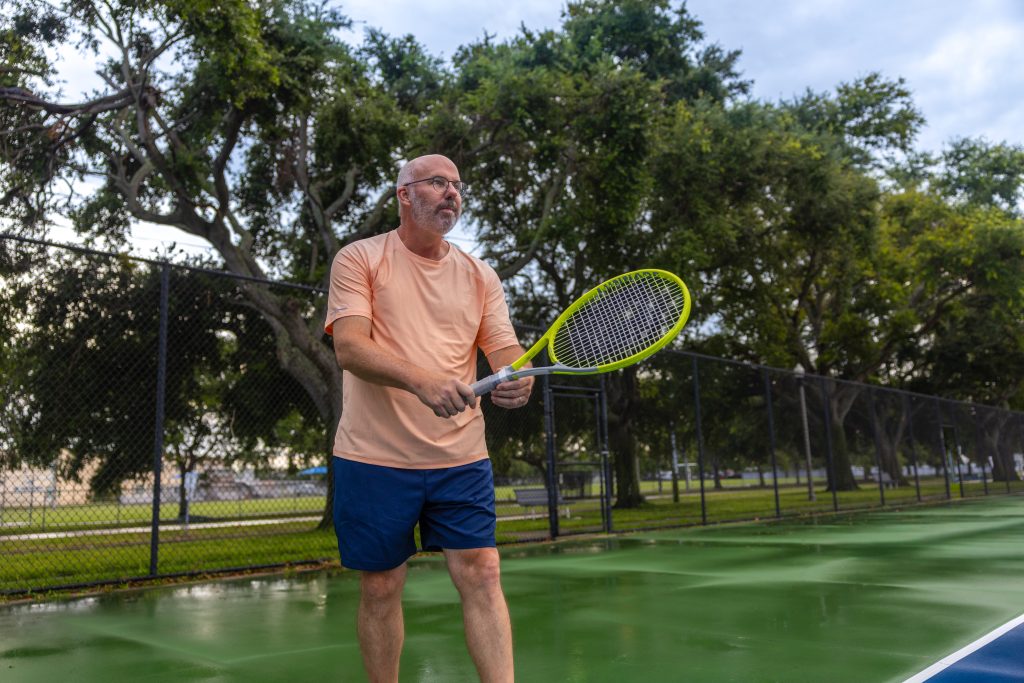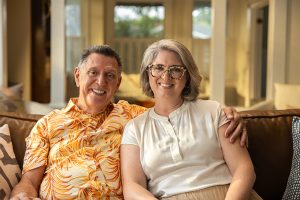For more than two decades, Dr. John Morgan sat across from Parkinson’s patients guiding them through diagnoses, treatment options, and the emotional toll the disease can take. As a neurologist and movement disorder specialist, he had seen it all from early-stage tremors, mid-stage medication adjustments, and the complex progression of symptoms that often unfold over many years.
But he never expected to become one of those patients himself.
From clinical expertise to personal experience
Dr. Morgan’s journey into neurology began with a fascination for how the brain works, how it develops and grows, how it adapts to insults, and how it breaks down. After studying developmental neuroscience, he knew he wanted to continue his career furthering his understanding of the brain’s mysteries. “Neurology was such an attractive field because I could see the evidence of disease on my examination and testing. Neuroanatomy taught me how to localize where the problem was in the nervous system.” he explained. “Tests such as a spinal tap, a DAT scan or MRI, are there to help me confirm what I am seeing clinically. It wasn’t guesswork.”
During medical school, he met a mentor who introduced him to the field of movement disorders, Dr. Kapil Sethi. That relationship shaped his career, eventually leading Dr. Morgan back to Georgia to help build a specialty clinic.
He would go on to care for over a thousand Parkinson’s patients over the next two decades, many of whom he helped treat for many years. Still, nothing fully prepared him for the moment he became the patient.
It started with something small, a subtle foot tremor. “At first, I thought I was just jiggling my right leg out of habit. But it kept going after I stopped. I was dragging my foot a little. Typing got slower in my right hand. And I just knew.” An informal visit with Dr. Sethi confirmed what he suspected. He had Parkinson’s.
Dr. Morgan was diagnosed in 2020. His initial response was matter of fact “This sucks. But I wasn’t afraid. I’ve lived with this disease for over 20 years through my patients. I knew what I was facing.”
Being a doctor gave him clarity. Being a patient gave him empathy.
He soon began to understand Parkinson’s in a whole new way, not just clinically, but physically and emotionally. Turning over in bed became harder. Parkinson’s affected how he gripped his tennis racket and his ability to hit topspin. He now uses speech-to-text tools and most recently DAX Copilot using AI in the patient/care partner encounter improving his speed and accuracy of interactions in his office.
“There are things you don’t notice until you live them. Like how hard it is to turn over in bed, or how stiff your whole body can feel when you wake up. It’s not just weakness. It’s like moving in a weighted suit.”
Despite his symptoms, Dr. Morgan continues to live an incredibly full life. He plays tennis regularly with a group of older players, many of whom were college-level athletes. He fishes, hikes, and recently repelled for the first time in his life down an 80-foot rock face using his non-dominant hand. He jokes that he wasn’t thrilled, but he made it down safely. “I lived,” he laughed. “Barely.”
“You’ve got Parkinson’s, but it doesn’t have you.”
When Dr. Morgan shares his diagnosis with patients, especially younger or newly diagnosed individuals, it changes everything.
“I tell them, ‘I’ve had Parkinson’s for five years. Do I look okay to you?’ And they say, ‘Yeah, you do.’ That moment gives people hope. They realize this isn’t the end of their story. It’s just the next chapter.”
His philosophy is simple but powerful—focus on what you can do, not what you can’t. And surround yourself with people who help you stay positive.

He also urges patients to bring loved ones into the process early. “You need a support system. And you need to be careful not to overwhelm yourself or them. Read just enough. Learn about your symptoms. Don’t obsess over every ‘what if.’ Live your life.”
The right treatment for his life
One of the most challenging parts of Parkinson’s for many patients is the complexity of medication. Dr. Morgan sees it firsthand in his clinic. So, when it came time to choose his own therapy, he knew exactly where he stood.
“I never used immediate-release carbidopa/levodopa. As a doctor, I knew how hard that schedule of taking medicine 3–5 times per day could be. So I started with a once-daily MAO-B inhibitor, a once-daily extended-release dopamine agonist and then added RYTARY®.”

Despite his clinical discipline, the demands of a packed schedule made adherence difficult. “I was missing doses or late taking them. When an extended-release version of carbidopa-levodopa came to market, I knew that drug, “CREXONT”, was for me. That’s when he and his care team decided to switch to CREXONT® (carbidopa and levodopa) extended-release capsules.
“CREXONT gave me a smooth experience. It’s helped me stay focused on my life, not my medication.”
Today, Dr. Morgan takes CREXONT and continues working full-time, splitting his week between his academic medical center clinic, a local VA hospital, and a satellite location between Augusta and Atlanta. He sees 40–50 patients a week and makes time to travel with his wife and family, enjoy his mountain getaway, and dive into his favorite pastime, tennis.
A life that’s still full
Whether he’s spending time with family, collecting old comic books, studying the stock market, attending plays and concerts, or playing tennis, Dr Morgan is all in.
“Slowness is real. But so is joy. So is purpose.”
He reminds his patients and himself that Parkinson’s may change how you move, but it doesn’t define who you are.
“You may have Parkinson’s, but it doesn’t have you. And when you truly believe that, everything changes.”
Dr Morgan’s story is one of courage, clinical wisdom, and personal growth. It’s a reminder to patients everywhere that with the right mindset, the right treatment, and the right support, you don’t have to lose yourself in the diagnosis.
You can keep living. You can keep doing what you love. And you can still be you.
Dr. Morgan is a paid consultant for Amneal Pharmaceuticals. His experience with CREXONT is his own and may not reflect the experience of every patient. For some people, CREXONT may cause falling asleep during daily activities. Side effects may include nausea and anxiety. Individual results will vary. Always speak with your doctor to determine if CREXONT may be right for you. Only a healthcare provider can assess your condition and guide you to the appropriate treatment options.
More stories from real patients



